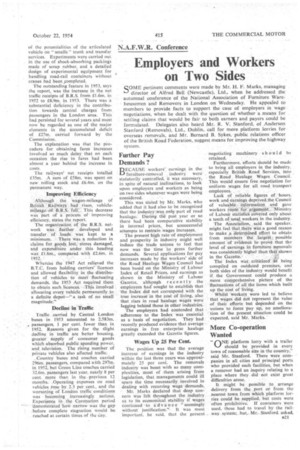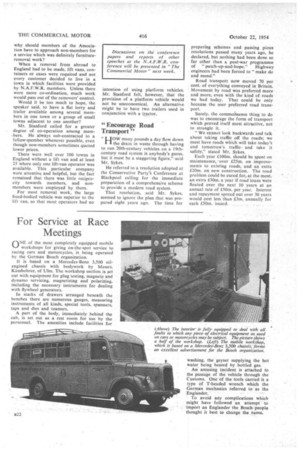N.A.F.W.R. Conference
Page 55

Page 56

If you've noticed an error in this article please click here to report it so we can fix it.
Employers and Workers on Two Sides
SOME pertinent comments were made by Mr. H. F. Marks, managing director of Alfred Bell (Newcastle), Ltd., when he addressed the autumnal conference of the National Association of Furniture Warehousemen and Removers in London on Wednesday. He appealed to members to provide facts to support the case of employers in wage negotiations, when he dealt with the question of whether a means for settling claims that would be fair to both earners and payers Could be formulated. Delegates also heard Mr. R. V. Stanford, of Anderson Stanford (Removals), Ltd., Dublin, call for more platform lorries for overseas removals, and Mr. Bernard B. Sykes, public relations officer of the British Road Federation, suggest means for improving the highway system.
Further Pay Demands ?
ECAUSE workers' earnings in the furniture-removal industry were statutorily controlled, it was necessary, in spite of natural inclinations, to look upon employers and workers as being on two sides whenever wages Were being considered.
This was stated by Mr. Marks, who added that it had also to be recognized that the industry was only part of road haulagei During the past year or so there had been comparative stability in internal prices, but unsuccessful attempts to restrain .wages increases.
The present high rate of employment and prosperity in industry might well induce the trade unions to feel that now was the time to press further demands. Several applications for pay increases made by the workers' side of the Road Haulage Wages Council had been based on the Ministry of Labour Index of Retail Prices, and earnings as shown in the Ministry of Labour Gazette, although recently the employees had sought to establish that the Index did not correspond with the true increase in the cost of living, also' that rises in road haulage wages were lagging behind those in other industries.'
The employers had contended that adherence to the Index was essential as a basis of negotiation. They had recently produced evidence that average earnings in free enterprise haulage greatly exceeded the Gazette figures.
Wages Up 25 Per Cent.
The position was that the average increase of earnings in the industry within the last three years was approximately 25 per cent. The removals industry was beset with so many complexities, most of them arising from legislation, that managements could ill spare the time necessarily involved in dealing with recurring wage demands.
Mr. Marks declared that deep concern was felt throughout the industry as to its economical stability if wages continued to ad v a n c e "seemingly without iustification.". It was most important. he said, that the present
negotiating machinery sh ould be retained.
Furthermore, 'efforts should be made to bring all employers in the industry, especially British Road Services, into the Road Haulage Wages Council. This would ensure free negotiation for uniform wages for all road transport employees.
Lack of reliable figures of hours, work and earnings deprived the Council of valuable information and gave workers room for argument., Ministry of Labour statistics ccivered only about a tenth of total vvorkers in the industry.
• The Association, said the speaker, might feel that there was .a good reason to make a determined effort to obtain from members the largest possible amount of evidence to prove that the level of earnings in furniture removals was consistently higher than that shown in the Gazette.
The Index was, criticized' IS being compiled on outdated premises, and both sides of the industry would benefit if the Government could produce a more 'comprehensive picture of the fluctuations Of all the items which built up the cost of living.
Whilst workers were led to believe that wages did not represent the value of their efforts but depended on the
• unions to force pay up, no amelioration of the present situation could be expected, said Mr. Marks.
More Co-operation Wanted
" ONE platform lorry with a trailer should be provided in every town of reasonable size in the country," said Mr. Stanford. There were companies in all cities and principal ports who provided such facilities, but when a remover had an inquiry relating to a place where they did not exist great difficulties arose.
It might be possible to arrange delivery from the port or from the nearest town from which platform lorries could be supplied, but costs were often prohibitive. If containers were used, these had to travel by the railway, system.; but, Mr.Stanfor4 asked,
why should members of the Association have to approach non-members for a service which was definitely furnitureremoval work?
When a removal from abroad to England had to be made, lift vans, containers or cases were required and not every customer decided to live in a town in which facilities were provided by N.A.F.W.R. members. Unless there were more co-ordination, much work would pass out of the removers' control.
Would it be too much to hope, the speaker said, to have a flat lorry and trailer available among several members in one town or a group of small towns adjacent to one another?
Mr. Stanford called for a greater degree of co-operation among mem,bers. He always sub-contracted to a fellow-member whenever possible, even though non-members sometimes quoted lower prices.
There were well over 100 towns in England without a lift van and at least 25 where only one lift-van operator was available. This particular company were attentive and helpful, but the fact remained that there was little reciprocity towards members, and nonmembers were employed by them.
For most removal work, the large fixed-bodied vehicle was superior to the lift van, so that most operators had no
intention of using platform vehicles. Mr. Stanford felt, however, that the provision of a platform vehicle would not be uneconomical. An alternative might be to have two trailers used in conjunction with a tractor.
"Encourage Road Transport"
"H OW many pounds a day flow down the drain in waste through having to run. 20th-century vehicles on a 19thcentury road system is anybody's guess, but it must be a staggering figure,". said Mr. Sykes.
He referred to a resolution adopted at the Conservative Party's Conference at Blackpool calling for the immediate preparation of a comprehensive scheme to provide a modern road system.
That resolution, said Mr. Sykes, seemed to ignore the plan that was prepared eight years ago. The time for preparing schemes and passing pious resolutions passed many years ago, he declared, but nothing had been done so far other than a post-war programme of "patch-up-and-hope." Highway engineers had been forced to "make do and mend."
Road transport now moved 70 per cent. of everything conveyed in Britain. Movement by road was preferred more and more, even with the kind of roads we had today. That could be only because the user preferred road transport. Surely, the commasense thing to do was to encourage the form of transport which proved itself most attractive, not to strangle it. .
"We cannot look backwards and talk about taking traffic off the roads; we must have roads which will take today's and tomorrow's traffic. and take it safely," stated Mr. Sykes.
Each year £100m. should be spent on maintenance,-over £25m. on improvements to existing roads, and an extra £20m. on new construction. The road problem amid be cured for, at the most, an extra £30m. a year if road loans were floated over the next 10 years at an annual rate of £50m. per year. Interest and repayment spread out over 30 years would cost less than am. annually for each £50m. issued.




































































































